【中考考点清单】2014年中考英语(湖南专用 新课标)总复习课件:第一部分 教材知识梳理 七年级(上)Unit 3(含中考试题示例)
文档属性
| 名称 | 【中考考点清单】2014年中考英语(湖南专用 新课标)总复习课件:第一部分 教材知识梳理 七年级(上)Unit 3(含中考试题示例) | 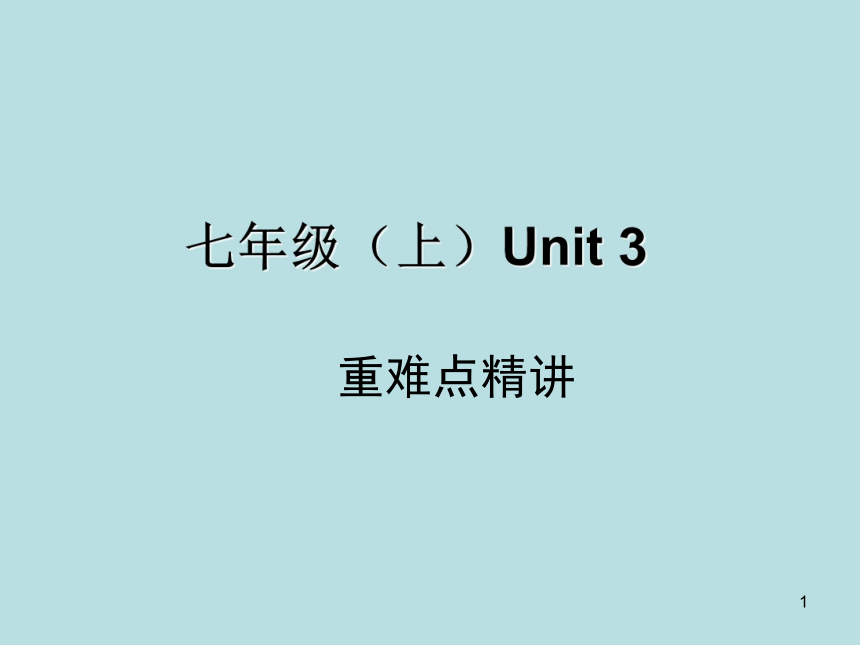 | |
| 格式 | zip | ||
| 文件大小 | 423.7KB | ||
| 资源类型 | 教案 | ||
| 版本资源 | 通用版 | ||
| 科目 | 英语 | ||
| 更新时间 | 2014-01-21 19:37:02 | ||
图片预览

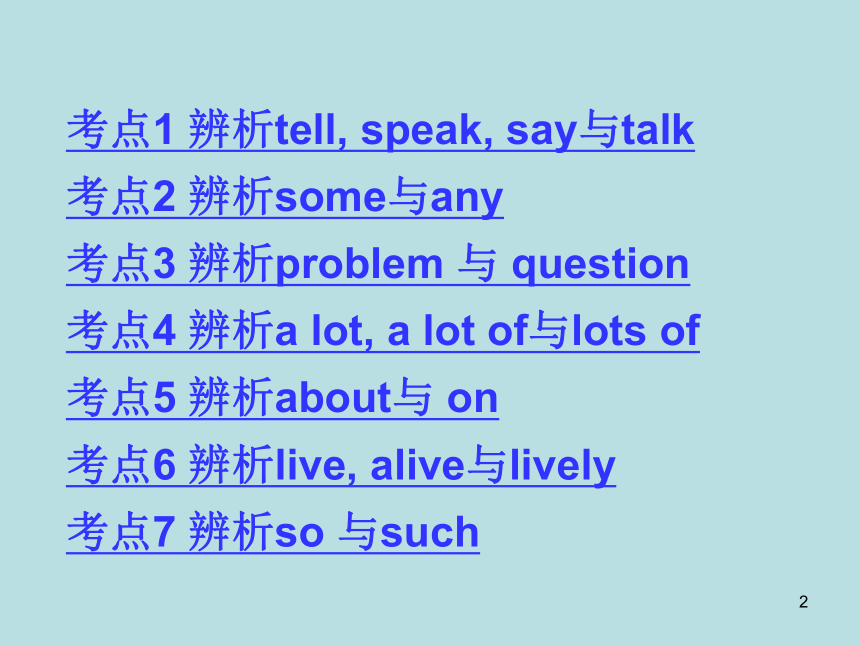
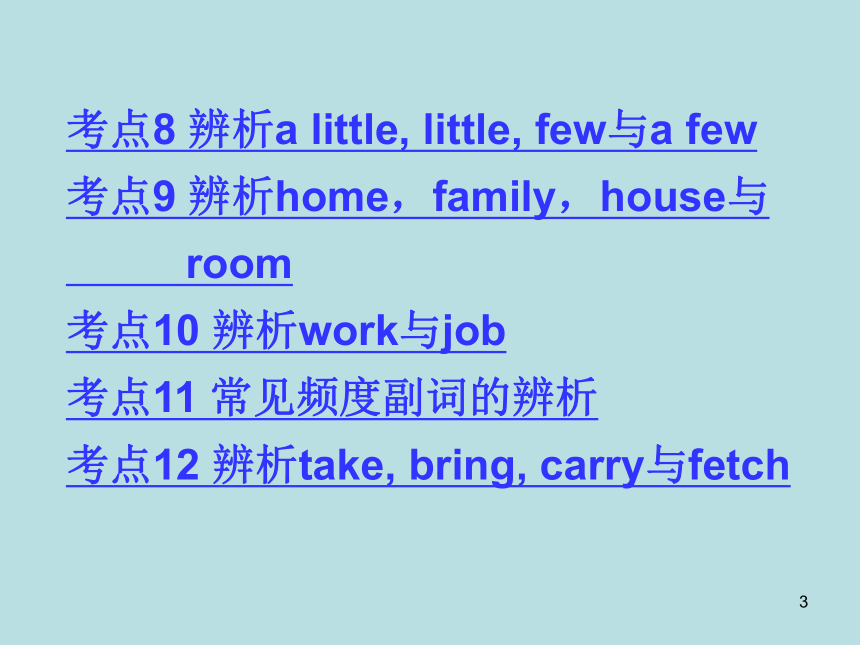




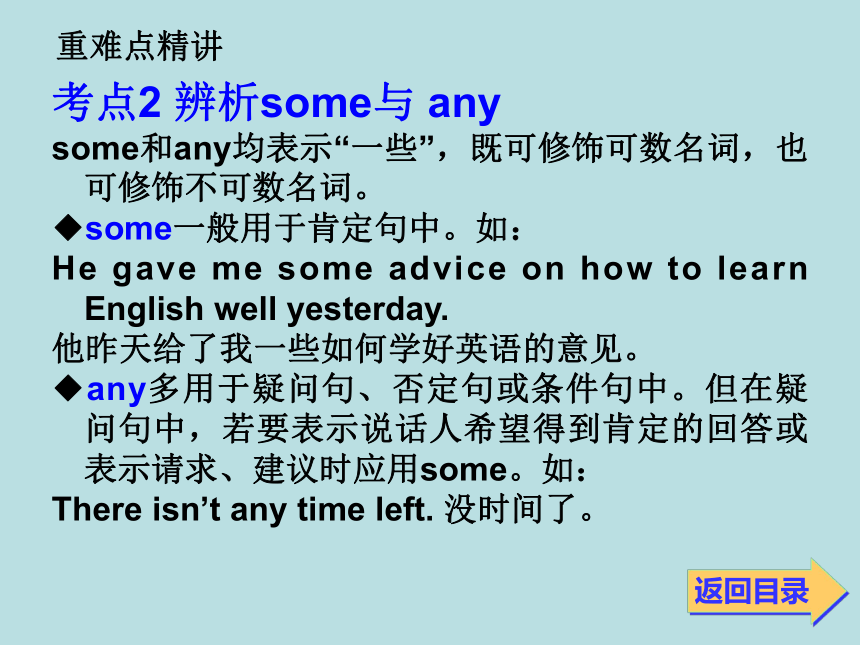
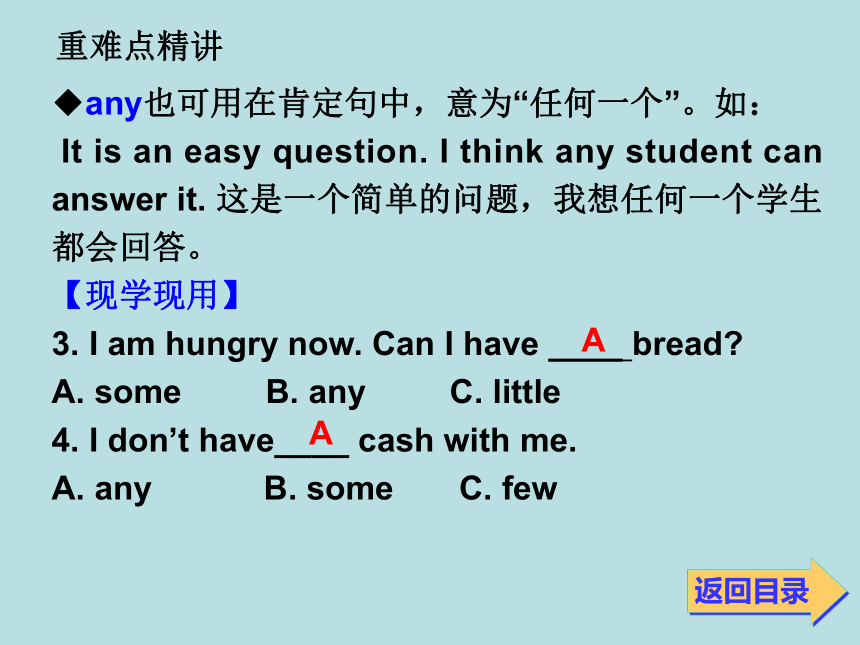

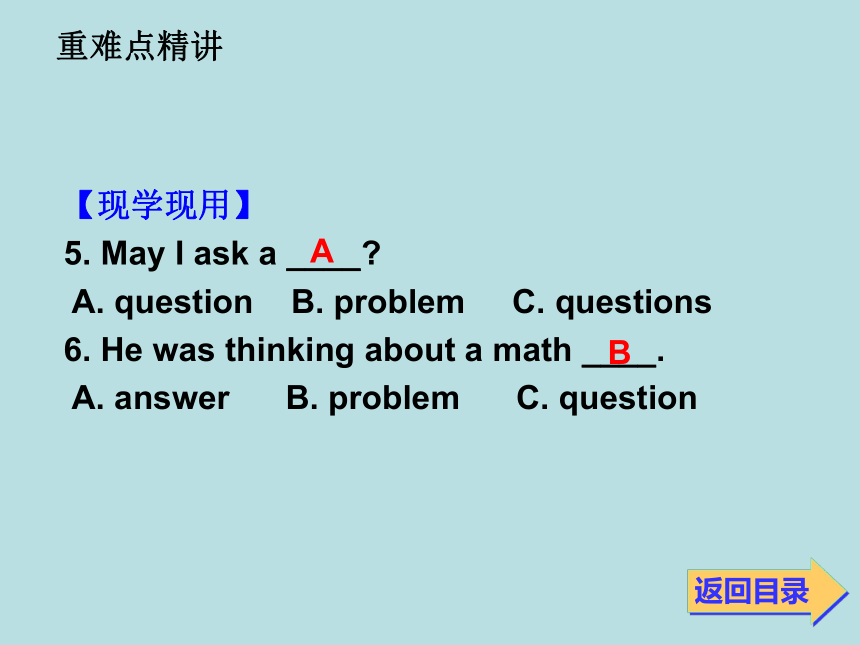

文档简介
课件45张PPT。1
重难点精讲 七年级(上)Unit 32 考点1 辨析tell, speak, say与talk
考点2 辨析some与any
考点3 辨析problem 与 question
考点4 辨析a lot, a lot of与lots of
考点5 辨析about与 on
考点6 辨析live, alive与lively
考点7 辨析so 与such
3 考点8 辨析a little, little, few与a few
考点9 辨析home,family,house与
room
考点10 辨析work与job
考点11 常见频度副词的辨析
考点12 辨析take, bring, carry与fetch
4 考点13 order的用法
考点14 Why not do... ? 句型
考点15 need的用法
考点16 look forward to的用法
5考点1 辨析tell, speak, say与talk
◆tell侧重指“告诉”,可以和lie, story 等词搭配。
tell sb. to do sth.表示“告诉某人做某事”。如:
From his face we could see that he was telling
a lie. 从他的表情我们可以看出他在撒谎。
Miss Chen tells us to be honest.
陈老师告诉我们要诚实。
◆speak既可指说话的能力,也可表示“演讲,发
言”。另外,其后可接语言类词汇。如:
He can speak French. 他会讲法语。
She is speaking at the meeting.
她正在会上发言。重难点精讲返回目录◆say强调说的内容。如:
Fangfang says she is at home. 芳芳说她在家。
◆talk指两人或更多的人进行谈话。
talk to/with sb. 表示“与某人交谈”;
talk about sb. /sth.表示“谈论某人/某事”。如:
They are talking about the news.
他们在谈论新闻。
6重难点精讲
【现学现用】
1. Mary can ____English very well, so she can
communicate with foreigners fluently.
A. say B. speak C. talk
2. I can’t help you if you don’t ____me the
truth.
A. say B. tell C. speak 7BB重难点精讲返回目录考点2 辨析some与 any
some和any均表示“一些”,既可修饰可数名词,也可修饰不可数名词。
◆some一般用于肯定句中。如:
He gave me some advice on how to learn English well yesterday.
他昨天给了我一些如何学好英语的意见。
◆any多用于疑问句、否定句或条件句中。但在疑问句中,若要表示说话人希望得到肯定的回答或表示请求、建议时应用some。如:
There isn’t any time left. 没时间了。
8重难点精讲返回目录◆any也可用在肯定句中,意为“任何一个”。如:
It is an easy question. I think any student can answer it. 这是一个简单的问题,我想任何一个学生都会回答。
【现学现用】
3. I am hungry now. Can I have ____ bread?
A. some B. any C. little
4. I don’t have____ cash with me.
A. any B. some C. few
9AA重难点精讲返回目录考点3 辨析problem 与 question
◆problem指被提出的疑难的、困难的、需要解决的问题,如:失业、人口等问题。如:
Don’t worry. I will help you to solve the problem. 别担心,我将会帮助你解决这个问题的。
◆question多指对不懂的事情提出的问题,往往期待他人给予答案;也可指需要考虑、讨论的问题,常与ask/answer连用。如:
Who can answer the question?
谁能回答这个问题?
10重难点精讲返回目录
【现学现用】
5. May I ask a ____?
A. question B. problem C. questions
6. He was thinking about a math ____.
A. answer B. problem C. question
11AB重难点精讲返回目录考点4 辨析a lot, a lot of与lots of
◆a lot意为“很,非常”,修饰动词(相当于very much)、形容词或副词的比较级(相当于much),表程度。如:
I’m feeling a lot better today. 我今天感觉好多了。
Thanks a lot for your help. 非常感谢你的帮助。
◆a lot of =lots of意为“很多,许多”。修饰名词,表数量,既可修饰可数名词,相当于many,又可修饰不可数名词,相当于much。12重难点精讲返回目录如:
What a lot of presents! 礼品真多啊!
I like black coffee with lots of sugar.
我喜欢放很多糖的黑咖啡。
【现学现用】
7. The foreigner knows____about Chinese history. He also can speak ____ Chinese.
A. a lot of; much B. many; much C. a lot; much
8. The book cost me ____of money.
A. lot B. a lot C. a lots
13BC重难点精讲返回目录考点5 辨析about与 on
◆ about和on都可和某些名词或动词连用,表示“关于”的意思。在涉及文章,书籍,谈话,演说,报告等有关内容时,两者可通用。例如:a book on/about the radio(一本关于无线电的书)。
◆about 表示的内容较为普通,不那么正式,还可指“关于”某人或某事物的较详细的情况;如:
This is a book for children about Africa and its people.
这是一本供儿童阅读的有关非洲和非洲人的书。
14重难点精讲返回目录◆on用于较正式的场合,表示这本书,这篇文章或演说是严肃的或学术性的,着重于知识的深度。如:
We are going to listen to a lecture on Africa history this afternoon.
今天下午我们将听(一个关于)非洲历史的演讲。
【现学现用】
9. Can you tell me something ____ yourself?
A. On B. about C. to
10. It’s a textbook ____the history of China.
A. In B. about C. on
15BC重难点精讲返回目录考点6 辨析live, alive与lively
◆live读作/liv/时,为动词,意为“居住;生活;生存”;live读作/laIv/时,为形容词,意为“活着的”,可用作定语,放在表示物的名词前,一般不指人;如:
My grandparents live in Canada.
我爷爷奶奶住在加拿大。
Have you seen a live whale?
你看见过活的鲸鱼吗?
◆alive在句中只作表语,意为“活着的,有活力的”。如:
He was very much alive last time I saw him.
我上次看见他的时候他还是生龙活虎的。
16重难点精讲返回目录◆lively意为“活泼的;活跃的;充满生气的”,可用作定语或表语,既可指人,也可指物。如:
I feel everything here is very lively.
我觉得这儿的一切都非常富有生气。
【现学现用】
11. Zhang Henshui is one of the greatest and oldest ____writer. He is still ____.
A. living; alive B. living; living C. alive; living
12. It is said that the boy has a ____mind.
A. living B. lively C. alive
17AB重难点精讲返回目录18考点7 辨析so 与such
so修饰形容词或副词; such修饰名词或名词短语;两词都可与that引导的句子连用。具体用法如下:
a/an+adj.+单数名词
adj.+不可数名词
adj.+复数名词
adj./adv.
adj.+a/an+单数名词
many/few/much/little+可数名词复数/不可
数名词
重难点精讲返回目录such +so +如:
Wang Lin is such a clever boy. =Wang Lin is so clever a boy.
王林是如此聪明的一个男孩。
【现学现用】
13. —Did you see the film last night?
—Yes, I have never seen____exciting film before.
A. such a B. so an C. such an
14. He is ____excited that he can hardly say a word.
A. such a B. so C. such an
19CB重难点精讲返回目录考点8 辨析a little, little, few与a few
◆a little意为“一点儿,少量的”,修饰不可数名词,用作定语,表示肯定含义。
He speaks a little English. 他会讲一点英语。
注意:a little还可作程度副词,修饰形容词、副词或其比较级,意为“一点儿”,而a few不能。如:
She felt tired and a little worried.
她感到既疲劳又有点担忧。
◆little意为“很少的,几乎没有的”,修饰不可数名词,表示否定含义。如:
You eat very little. 你吃得很少。
20重难点精讲返回目录◆few意为“很少的,几乎没有的”,用作定语,修饰可数名词,表示否定含义。
Few people like snakes. 很少有人喜欢蛇。
◆a few用作定语,修饰可数名词,意为“几个”,表示肯定含义。如:
Can you stay a few days longer? 你能多留几天吗?
21重难点精讲返回目录
【现学现用】
15. —Mom, please give me ____minutes to finish the computer games.
—No, it’s time to do your homework.
A. a little B. a few C. a kind
16. There is ____water in the bottle. Can you get some for me?
A. little B. few C. a little
22BA重难点精讲返回目录考点9 辨析home,family,house与room
◆home表示“家,家庭”, 指个人或家庭居住所, 常含有“爱、温暖、舒适、安全”等意味。如:
There is no place like home. (谚)无处比家好。
◆family表示“家,家庭”,是可数名词,作主语时,谓语动词用单数。family也可表示“家庭成员”,是集体名词,作主语时,谓语动词用复数。如:
Mary has a big family.
玛丽有个大家庭。(作“家庭”讲)
My family are all well.
我全家人身体都很健康。(作“家庭成员”讲)
23重难点精讲返回目录◆house表示“家,宅子”, 指建筑物。如:
Please come to my house for dinner.
请到我家来吃饭。
◆room表示“房间;起居室”,指房间时,包含在房子里面,是可数名词。如:
There are three rooms in my house.
这个房子里有三个房间。
24重难点精讲返回目录
【现学现用】
17. His family live in a big .
A. house B. home C. family
18. Thanks for the photo of your ____. It’s really nice.
A. room B. house C. family
25AC重难点精讲返回目录考点10 辨析work与job
◆work作为动词时,为不及物动词,其后常接介词in。如:
My father works in a factory.
我父亲在一家工厂工作。
◆work还可作为名词,作为名词时是不可数名词,指
需要花体力和脑力来完成的工作。如:
He is out of work. 他失业了。
◆job是可数名词,指一项具体的工作,多指“零工”
或“短工”。如:
Selling newspapers is his part-time job.
卖报纸是他的兼职工作。
26重难点精讲返回目录
【现学现用】
19. I have a lot of ____to do today, so I can’t go
out with you.
A. work B. job C. works
20. I heard that you had changed several .
A. job B. jobs C. works
27AB重难点精讲返回目录考点11 常见频度副词的辨析
常见的频度副词有always, usually, often,
sometimes, hardly, never。其频率大小如下图所示:
◆always意为“总是”,表示动作或状态中间没有间断
如:
The sun always rises in the east and sets in the
west. 太阳总是东升西落。
◆usually意为“通常”,即很少有例外。如:
He usually goes to bed at ten o’clock.
他通常10点钟睡觉。
28重难点精讲返回目录◆often意为“常常”,不如usually那么频繁。如:
He is often late for school. 他上学经常迟到。
◆sometimes意为“有时”,表示动作偶尔发生,可以位于句首,以示强调。如:
Sometimes he does it this way and sometimes he does it that way. 他有时这样做,有时那样做。
◆hardly意为“几乎不,简直不”,常和ever连用表示强调。如:
I hardly ever go out these days.
这些天我几乎不出门。
29重难点精讲返回目录◆never意为“从来不,永不”。如:
My parents are never late for work.
我父母上班从来不迟到。
30重难点精讲返回目录
【现学现用】
21. I can ____hear what you said. The music was
too noisy.
A. Always B. hardly C. usually
22. He____goes to work by bus because he
thinks it is environmentally friendly.
A. usually B. never C. sometimes
31BA重难点精讲返回目录考点12 辨析take, bring, carry与fetch
几个词都有“拿”“取”之意。
◆take指把某人或某物从说话人所在的地方带到别处。译作“带走”,“拿走”;bring与take是一对反义词,方向性较强。其形式通常表达为:bring/take+某人/某物+to+表示地点的词汇。若表示地点的词汇为副词,则前面的to省去。如:
Please take the umbrella with you when you go out. 当你出去时,请把雨伞带着。
32重难点精讲返回目录◆bring指把人或物从别处带到说话人所在的地方。译作“带来,拿来”。如:
Remember to bring your homework to school tomorrow. 明天记得把你的作业带到学校。
◆carry“提,拿”,不强调方向性,但有负重之意。如:
The box is too heavy. I can’t carry it.
箱子太重了,我搬不动。
◆fetch“拿来,取来”,与get同义,指先到别处去再把某物(人)带来,常用在口语中,强调的是动作的往返。33重难点精讲返回目录 如:
Have you fetched/gotten the doctor?
你把医生接来了吗?
34重难点精讲返回目录
【现学现用】
23. —What’s the weather like now?
—It’s going to rain. Please____a raincoat with
you if you go out.
A. Bring B. get C. take
24. The box is too heavy. Can you ____it for me?
A. take B. bring C. carry
35CC重难点精讲返回目录考点13 order 的用法
◆名词:①“顺序”②“命令,指示”③“订单”。如:
We had completed your order.
我们已经完成了你们的订单。
◆动词:①“命令”,常用结构:order sb. to do sth. ②“订购”。如:
He always orders others to do something for him. 他总是命令别人为他做一些事情。
◆order构成的短语
①in order 按顺序
②in order that 为了;以便
③in order to(接动词原形)为了
36重难点精讲返回目录◆in order to 表示“为了”,说的是做某事的目的,to后面要接动词原形。如:
He works hard in order to succeed.
他为了成功而努力工作。
【现学现用】
25. You must turn off the tap ____we can save water.
A. in order to B. in order that C. such that
26. He ordered me____ the book to her.
A. to lend B. lend C. lending
37BA重难点精讲返回目录考点14 Why not do... ? 句型
◆句型“Why not do sth.?”意为“你为什么不做某事呢?”表示商量和给对方建议,否定式疑问显得更加委婉,更容易被对方所接受,也可用句型“Why don’t you do... ?”。如:
Why not go shopping together?=Why don’t we go shopping together?我们为什么不一起去购物呢?
【知识拓展】其他用于“提建议”的句式还有:
①Let’s do sth. 意为“让我们做某事吧。”
38重难点精讲返回目录如:
Let’s have something new this time.
这次让我们尝点儿新东西吧。
②What/How about sth. /doing sth. ? 意为“……怎么样,……好不好?”如:
What about meeting outside the school gate?
在学校门外集合好不好?
③Why not do sth. ? 或 Why don’t you do sth.?意为“为什么不……呢?”如:
Why not/don’t you try it in another way?
你为什么不用别的方法试试呢?
39重难点精讲返回目录④ Would you like/love to do sth. ? 意为“你愿意做某事吗?”如:
Would you like to come on a trip with us?
你愿意和我们去旅行吗?
“提建议”的答语有:
①肯定回答:
Sure. /Of course. /Certainly. 当然,当然可以。
Good idea!/That’s a good idea! 好主意!
All right. /OK. 好吧。
Great!/Good!/Wonderful! 太棒了!
I’d like to. /I’d love to. /I’d be glad to. 我很乐意。
40重难点精讲返回目录②否定回答:
No, thank you. 不必了,谢谢。
Sorry, I’m afraid not. 对不起,恐怕不行。
Yes, I’d like to, but... 我很乐意,但是……。
【现学现用】
27. It’s dark in the room. Why not ____the light?
A. turn on B. turn off C. turning on
28. Why don’t you ____to see a doctor?
A. go B. to go C. going
41AA重难点精讲返回目录考点15 need的用法
◆need在此是及物动词, 意为“需要”,后面也可接动词不定式(to do)或动名词(doing), 表示“需要做某事”。need doing sth. 有被动的含义。如:
I need to know how to cook. 我需要了解怎样做饭。
This farm tool needs repairing. =This farm tool needs to be repaired. 这件农具需要修理。
◆need作情态动词,没有时态和人称变化。注意答语:肯定用must,否定用needn’t。
如:
42重难点精讲返回目录—Need I go? 我需要去吗?
—Yes, you must. 是的, 你必须去。
—No, you needn’t. 不, 你不必去。
【现学现用】
29. Thanks for your invitation, but I’m so sorry I can’t go. I need ____my baby at home.
A. look after B. to look after C. looking after
30. You’ve already tried your best,
so you____worry about the matter.
A. can’t B. needn’t C. mustn’t
43BB重难点精讲返回目录考点16 look forward to的用法
look forward to意为“盼望;期待”,其中to是介词,后面接动词时,要用v-ing形式。如:
I always look forward to buying a new car.
我总是盼望着买辆新车。
【知识拓展】
to 作为介词后接动名词的词组还有:
be used to 习惯于
devote oneself to 献身于
be devoted to 致力于
stick to 坚持
pay attention to 注意……
44重难点精讲返回目录如:
Please pay attention to talking in English.
请注意用英语交流。
Li Hua sticks to finishing his task in the heavy snow. 李华在大雪中坚持完成他的工作。
【现学现用】
31. Everybody was looking forward to ____ the mysterious city.
A. visit B. visiting C. visit to
32. I got up late in the morning. But now I am used to ____early.
A. get up B. getting up C. got up
45BB重难点精讲返回目录
重难点精讲 七年级(上)Unit 32 考点1 辨析tell, speak, say与talk
考点2 辨析some与any
考点3 辨析problem 与 question
考点4 辨析a lot, a lot of与lots of
考点5 辨析about与 on
考点6 辨析live, alive与lively
考点7 辨析so 与such
3 考点8 辨析a little, little, few与a few
考点9 辨析home,family,house与
room
考点10 辨析work与job
考点11 常见频度副词的辨析
考点12 辨析take, bring, carry与fetch
4 考点13 order的用法
考点14 Why not do... ? 句型
考点15 need的用法
考点16 look forward to的用法
5考点1 辨析tell, speak, say与talk
◆tell侧重指“告诉”,可以和lie, story 等词搭配。
tell sb. to do sth.表示“告诉某人做某事”。如:
From his face we could see that he was telling
a lie. 从他的表情我们可以看出他在撒谎。
Miss Chen tells us to be honest.
陈老师告诉我们要诚实。
◆speak既可指说话的能力,也可表示“演讲,发
言”。另外,其后可接语言类词汇。如:
He can speak French. 他会讲法语。
She is speaking at the meeting.
她正在会上发言。重难点精讲返回目录◆say强调说的内容。如:
Fangfang says she is at home. 芳芳说她在家。
◆talk指两人或更多的人进行谈话。
talk to/with sb. 表示“与某人交谈”;
talk about sb. /sth.表示“谈论某人/某事”。如:
They are talking about the news.
他们在谈论新闻。
6重难点精讲
【现学现用】
1. Mary can ____English very well, so she can
communicate with foreigners fluently.
A. say B. speak C. talk
2. I can’t help you if you don’t ____me the
truth.
A. say B. tell C. speak 7BB重难点精讲返回目录考点2 辨析some与 any
some和any均表示“一些”,既可修饰可数名词,也可修饰不可数名词。
◆some一般用于肯定句中。如:
He gave me some advice on how to learn English well yesterday.
他昨天给了我一些如何学好英语的意见。
◆any多用于疑问句、否定句或条件句中。但在疑问句中,若要表示说话人希望得到肯定的回答或表示请求、建议时应用some。如:
There isn’t any time left. 没时间了。
8重难点精讲返回目录◆any也可用在肯定句中,意为“任何一个”。如:
It is an easy question. I think any student can answer it. 这是一个简单的问题,我想任何一个学生都会回答。
【现学现用】
3. I am hungry now. Can I have ____ bread?
A. some B. any C. little
4. I don’t have____ cash with me.
A. any B. some C. few
9AA重难点精讲返回目录考点3 辨析problem 与 question
◆problem指被提出的疑难的、困难的、需要解决的问题,如:失业、人口等问题。如:
Don’t worry. I will help you to solve the problem. 别担心,我将会帮助你解决这个问题的。
◆question多指对不懂的事情提出的问题,往往期待他人给予答案;也可指需要考虑、讨论的问题,常与ask/answer连用。如:
Who can answer the question?
谁能回答这个问题?
10重难点精讲返回目录
【现学现用】
5. May I ask a ____?
A. question B. problem C. questions
6. He was thinking about a math ____.
A. answer B. problem C. question
11AB重难点精讲返回目录考点4 辨析a lot, a lot of与lots of
◆a lot意为“很,非常”,修饰动词(相当于very much)、形容词或副词的比较级(相当于much),表程度。如:
I’m feeling a lot better today. 我今天感觉好多了。
Thanks a lot for your help. 非常感谢你的帮助。
◆a lot of =lots of意为“很多,许多”。修饰名词,表数量,既可修饰可数名词,相当于many,又可修饰不可数名词,相当于much。12重难点精讲返回目录如:
What a lot of presents! 礼品真多啊!
I like black coffee with lots of sugar.
我喜欢放很多糖的黑咖啡。
【现学现用】
7. The foreigner knows____about Chinese history. He also can speak ____ Chinese.
A. a lot of; much B. many; much C. a lot; much
8. The book cost me ____of money.
A. lot B. a lot C. a lots
13BC重难点精讲返回目录考点5 辨析about与 on
◆ about和on都可和某些名词或动词连用,表示“关于”的意思。在涉及文章,书籍,谈话,演说,报告等有关内容时,两者可通用。例如:a book on/about the radio(一本关于无线电的书)。
◆about 表示的内容较为普通,不那么正式,还可指“关于”某人或某事物的较详细的情况;如:
This is a book for children about Africa and its people.
这是一本供儿童阅读的有关非洲和非洲人的书。
14重难点精讲返回目录◆on用于较正式的场合,表示这本书,这篇文章或演说是严肃的或学术性的,着重于知识的深度。如:
We are going to listen to a lecture on Africa history this afternoon.
今天下午我们将听(一个关于)非洲历史的演讲。
【现学现用】
9. Can you tell me something ____ yourself?
A. On B. about C. to
10. It’s a textbook ____the history of China.
A. In B. about C. on
15BC重难点精讲返回目录考点6 辨析live, alive与lively
◆live读作/liv/时,为动词,意为“居住;生活;生存”;live读作/laIv/时,为形容词,意为“活着的”,可用作定语,放在表示物的名词前,一般不指人;如:
My grandparents live in Canada.
我爷爷奶奶住在加拿大。
Have you seen a live whale?
你看见过活的鲸鱼吗?
◆alive在句中只作表语,意为“活着的,有活力的”。如:
He was very much alive last time I saw him.
我上次看见他的时候他还是生龙活虎的。
16重难点精讲返回目录◆lively意为“活泼的;活跃的;充满生气的”,可用作定语或表语,既可指人,也可指物。如:
I feel everything here is very lively.
我觉得这儿的一切都非常富有生气。
【现学现用】
11. Zhang Henshui is one of the greatest and oldest ____writer. He is still ____.
A. living; alive B. living; living C. alive; living
12. It is said that the boy has a ____mind.
A. living B. lively C. alive
17AB重难点精讲返回目录18考点7 辨析so 与such
so修饰形容词或副词; such修饰名词或名词短语;两词都可与that引导的句子连用。具体用法如下:
a/an+adj.+单数名词
adj.+不可数名词
adj.+复数名词
adj./adv.
adj.+a/an+单数名词
many/few/much/little+可数名词复数/不可
数名词
重难点精讲返回目录such +so +如:
Wang Lin is such a clever boy. =Wang Lin is so clever a boy.
王林是如此聪明的一个男孩。
【现学现用】
13. —Did you see the film last night?
—Yes, I have never seen____exciting film before.
A. such a B. so an C. such an
14. He is ____excited that he can hardly say a word.
A. such a B. so C. such an
19CB重难点精讲返回目录考点8 辨析a little, little, few与a few
◆a little意为“一点儿,少量的”,修饰不可数名词,用作定语,表示肯定含义。
He speaks a little English. 他会讲一点英语。
注意:a little还可作程度副词,修饰形容词、副词或其比较级,意为“一点儿”,而a few不能。如:
She felt tired and a little worried.
她感到既疲劳又有点担忧。
◆little意为“很少的,几乎没有的”,修饰不可数名词,表示否定含义。如:
You eat very little. 你吃得很少。
20重难点精讲返回目录◆few意为“很少的,几乎没有的”,用作定语,修饰可数名词,表示否定含义。
Few people like snakes. 很少有人喜欢蛇。
◆a few用作定语,修饰可数名词,意为“几个”,表示肯定含义。如:
Can you stay a few days longer? 你能多留几天吗?
21重难点精讲返回目录
【现学现用】
15. —Mom, please give me ____minutes to finish the computer games.
—No, it’s time to do your homework.
A. a little B. a few C. a kind
16. There is ____water in the bottle. Can you get some for me?
A. little B. few C. a little
22BA重难点精讲返回目录考点9 辨析home,family,house与room
◆home表示“家,家庭”, 指个人或家庭居住所, 常含有“爱、温暖、舒适、安全”等意味。如:
There is no place like home. (谚)无处比家好。
◆family表示“家,家庭”,是可数名词,作主语时,谓语动词用单数。family也可表示“家庭成员”,是集体名词,作主语时,谓语动词用复数。如:
Mary has a big family.
玛丽有个大家庭。(作“家庭”讲)
My family are all well.
我全家人身体都很健康。(作“家庭成员”讲)
23重难点精讲返回目录◆house表示“家,宅子”, 指建筑物。如:
Please come to my house for dinner.
请到我家来吃饭。
◆room表示“房间;起居室”,指房间时,包含在房子里面,是可数名词。如:
There are three rooms in my house.
这个房子里有三个房间。
24重难点精讲返回目录
【现学现用】
17. His family live in a big .
A. house B. home C. family
18. Thanks for the photo of your ____. It’s really nice.
A. room B. house C. family
25AC重难点精讲返回目录考点10 辨析work与job
◆work作为动词时,为不及物动词,其后常接介词in。如:
My father works in a factory.
我父亲在一家工厂工作。
◆work还可作为名词,作为名词时是不可数名词,指
需要花体力和脑力来完成的工作。如:
He is out of work. 他失业了。
◆job是可数名词,指一项具体的工作,多指“零工”
或“短工”。如:
Selling newspapers is his part-time job.
卖报纸是他的兼职工作。
26重难点精讲返回目录
【现学现用】
19. I have a lot of ____to do today, so I can’t go
out with you.
A. work B. job C. works
20. I heard that you had changed several .
A. job B. jobs C. works
27AB重难点精讲返回目录考点11 常见频度副词的辨析
常见的频度副词有always, usually, often,
sometimes, hardly, never。其频率大小如下图所示:
◆always意为“总是”,表示动作或状态中间没有间断
如:
The sun always rises in the east and sets in the
west. 太阳总是东升西落。
◆usually意为“通常”,即很少有例外。如:
He usually goes to bed at ten o’clock.
他通常10点钟睡觉。
28重难点精讲返回目录◆often意为“常常”,不如usually那么频繁。如:
He is often late for school. 他上学经常迟到。
◆sometimes意为“有时”,表示动作偶尔发生,可以位于句首,以示强调。如:
Sometimes he does it this way and sometimes he does it that way. 他有时这样做,有时那样做。
◆hardly意为“几乎不,简直不”,常和ever连用表示强调。如:
I hardly ever go out these days.
这些天我几乎不出门。
29重难点精讲返回目录◆never意为“从来不,永不”。如:
My parents are never late for work.
我父母上班从来不迟到。
30重难点精讲返回目录
【现学现用】
21. I can ____hear what you said. The music was
too noisy.
A. Always B. hardly C. usually
22. He____goes to work by bus because he
thinks it is environmentally friendly.
A. usually B. never C. sometimes
31BA重难点精讲返回目录考点12 辨析take, bring, carry与fetch
几个词都有“拿”“取”之意。
◆take指把某人或某物从说话人所在的地方带到别处。译作“带走”,“拿走”;bring与take是一对反义词,方向性较强。其形式通常表达为:bring/take+某人/某物+to+表示地点的词汇。若表示地点的词汇为副词,则前面的to省去。如:
Please take the umbrella with you when you go out. 当你出去时,请把雨伞带着。
32重难点精讲返回目录◆bring指把人或物从别处带到说话人所在的地方。译作“带来,拿来”。如:
Remember to bring your homework to school tomorrow. 明天记得把你的作业带到学校。
◆carry“提,拿”,不强调方向性,但有负重之意。如:
The box is too heavy. I can’t carry it.
箱子太重了,我搬不动。
◆fetch“拿来,取来”,与get同义,指先到别处去再把某物(人)带来,常用在口语中,强调的是动作的往返。33重难点精讲返回目录 如:
Have you fetched/gotten the doctor?
你把医生接来了吗?
34重难点精讲返回目录
【现学现用】
23. —What’s the weather like now?
—It’s going to rain. Please____a raincoat with
you if you go out.
A. Bring B. get C. take
24. The box is too heavy. Can you ____it for me?
A. take B. bring C. carry
35CC重难点精讲返回目录考点13 order 的用法
◆名词:①“顺序”②“命令,指示”③“订单”。如:
We had completed your order.
我们已经完成了你们的订单。
◆动词:①“命令”,常用结构:order sb. to do sth. ②“订购”。如:
He always orders others to do something for him. 他总是命令别人为他做一些事情。
◆order构成的短语
①in order 按顺序
②in order that 为了;以便
③in order to(接动词原形)为了
36重难点精讲返回目录◆in order to 表示“为了”,说的是做某事的目的,to后面要接动词原形。如:
He works hard in order to succeed.
他为了成功而努力工作。
【现学现用】
25. You must turn off the tap ____we can save water.
A. in order to B. in order that C. such that
26. He ordered me____ the book to her.
A. to lend B. lend C. lending
37BA重难点精讲返回目录考点14 Why not do... ? 句型
◆句型“Why not do sth.?”意为“你为什么不做某事呢?”表示商量和给对方建议,否定式疑问显得更加委婉,更容易被对方所接受,也可用句型“Why don’t you do... ?”。如:
Why not go shopping together?=Why don’t we go shopping together?我们为什么不一起去购物呢?
【知识拓展】其他用于“提建议”的句式还有:
①Let’s do sth. 意为“让我们做某事吧。”
38重难点精讲返回目录如:
Let’s have something new this time.
这次让我们尝点儿新东西吧。
②What/How about sth. /doing sth. ? 意为“……怎么样,……好不好?”如:
What about meeting outside the school gate?
在学校门外集合好不好?
③Why not do sth. ? 或 Why don’t you do sth.?意为“为什么不……呢?”如:
Why not/don’t you try it in another way?
你为什么不用别的方法试试呢?
39重难点精讲返回目录④ Would you like/love to do sth. ? 意为“你愿意做某事吗?”如:
Would you like to come on a trip with us?
你愿意和我们去旅行吗?
“提建议”的答语有:
①肯定回答:
Sure. /Of course. /Certainly. 当然,当然可以。
Good idea!/That’s a good idea! 好主意!
All right. /OK. 好吧。
Great!/Good!/Wonderful! 太棒了!
I’d like to. /I’d love to. /I’d be glad to. 我很乐意。
40重难点精讲返回目录②否定回答:
No, thank you. 不必了,谢谢。
Sorry, I’m afraid not. 对不起,恐怕不行。
Yes, I’d like to, but... 我很乐意,但是……。
【现学现用】
27. It’s dark in the room. Why not ____the light?
A. turn on B. turn off C. turning on
28. Why don’t you ____to see a doctor?
A. go B. to go C. going
41AA重难点精讲返回目录考点15 need的用法
◆need在此是及物动词, 意为“需要”,后面也可接动词不定式(to do)或动名词(doing), 表示“需要做某事”。need doing sth. 有被动的含义。如:
I need to know how to cook. 我需要了解怎样做饭。
This farm tool needs repairing. =This farm tool needs to be repaired. 这件农具需要修理。
◆need作情态动词,没有时态和人称变化。注意答语:肯定用must,否定用needn’t。
如:
42重难点精讲返回目录—Need I go? 我需要去吗?
—Yes, you must. 是的, 你必须去。
—No, you needn’t. 不, 你不必去。
【现学现用】
29. Thanks for your invitation, but I’m so sorry I can’t go. I need ____my baby at home.
A. look after B. to look after C. looking after
30. You’ve already tried your best,
so you____worry about the matter.
A. can’t B. needn’t C. mustn’t
43BB重难点精讲返回目录考点16 look forward to的用法
look forward to意为“盼望;期待”,其中to是介词,后面接动词时,要用v-ing形式。如:
I always look forward to buying a new car.
我总是盼望着买辆新车。
【知识拓展】
to 作为介词后接动名词的词组还有:
be used to 习惯于
devote oneself to 献身于
be devoted to 致力于
stick to 坚持
pay attention to 注意……
44重难点精讲返回目录如:
Please pay attention to talking in English.
请注意用英语交流。
Li Hua sticks to finishing his task in the heavy snow. 李华在大雪中坚持完成他的工作。
【现学现用】
31. Everybody was looking forward to ____ the mysterious city.
A. visit B. visiting C. visit to
32. I got up late in the morning. But now I am used to ____early.
A. get up B. getting up C. got up
45BB重难点精讲返回目录
